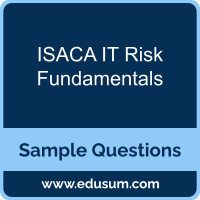 The purpose of this Sample Question Set is to provide you with information about the ISACA IT Risk Fundamentals exam. These sample questions will make you very familiar with both the type and the difficulty level of the questions on the IT Risk Fundamentals certification test. To get familiar with real exam environment, we suggest you try our Sample ISACA IT Risk Fundamentals Certification Practice Exam. This sample practice exam gives you the feeling of reality and is a clue to the questions asked in the actual ISACA IT Risk Fundamentals certification exam.
The purpose of this Sample Question Set is to provide you with information about the ISACA IT Risk Fundamentals exam. These sample questions will make you very familiar with both the type and the difficulty level of the questions on the IT Risk Fundamentals certification test. To get familiar with real exam environment, we suggest you try our Sample ISACA IT Risk Fundamentals Certification Practice Exam. This sample practice exam gives you the feeling of reality and is a clue to the questions asked in the actual ISACA IT Risk Fundamentals certification exam.
These sample questions are simple and basic questions that represent likeness to the real ISACA IT Risk Fundamentals exam questions. To assess your readiness and performance with real-time scenario based questions, we suggest you prepare with our Premium ISACA IT Risk Fundamentals Certification Practice Exam. When you solve real time scenario based questions practically, you come across many difficulties that give you an opportunity to improve.
ISACA IT Risk Fundamentals Sample Questions:
Answers:
|
Question: 01 Answer: c |
Question: 02 Answer: d |
Question: 03 Answer: b |
Question: 04 Answer: a |
Question: 05 Answer: b, d |
|
Question: 06 Answer: b |
Question: 07 Answer: c |
Question: 08 Answer: a |
Question: 09 Answer: a, c |
Question: 10 Answer: d |
Note: For any error in ISACA IT Risk Fundamentals certification exam sample questions, please update us by writing an email on feedback@edusum.com.
